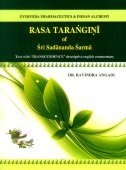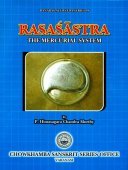Sharman, Śarma, Sarmā, Sarma, Sharma, Śarman: 25 definitions
Introduction:
Sharman means something in Hinduism, Sanskrit, Jainism, Prakrit, Marathi, Hindi, biology, Tamil. If you want to know the exact meaning, history, etymology or English translation of this term then check out the descriptions on this page. Add your comment or reference to a book if you want to contribute to this summary article.
The Sanskrit terms Śarma and Śarman can be transliterated into English as Sarma or Sharma or Sarman or Sharman, using the IAST transliteration scheme (?).
Images (photo gallery)
In Hinduism
Purana and Itihasa (epic history)
Source: Cologne Digital Sanskrit Dictionaries: The Purana Index1) Śarma (शर्म).—A common designation for a Brahman.*
- * Viṣṇu-purāṇa III. 10. 8-9.
2) Sarmā (सर्मा).—A daughter of Krodhavaśa and a wife of Pulaha: mother of Śyāma and Śabala, followers of Yama.*
- * Brahmāṇḍa-purāṇa III. 7. 172, 312, 441.
Śarma (शर्म) is a name mentioned in the Mahābhārata (cf. I.60.22) and represents one of the many proper names used for people and places. Note: The Mahābhārata (mentioning Śarma) is a Sanskrit epic poem consisting of 100,000 ślokas (metrical verses) and is over 2000 years old.

The Purana (पुराण, purāṇas) refers to Sanskrit literature preserving ancient India’s vast cultural history, including historical legends, religious ceremonies, various arts and sciences. The eighteen mahapuranas total over 400,000 shlokas (metrical couplets) and date to at least several centuries BCE.
Ayurveda (science of life)
Source: archive.org: Vagbhata’s Ashtanga Hridaya Samhita (first 5 chapters)Śarman (शर्मन्) refers to “comfort”, as mentioned in verse 4.29-31 of the Aṣṭāṅgahṛdayasaṃhitā (Sūtrasthāna) by Vāgbhaṭa.—Accordingly, “[...] If (a patient) has been debilitated by medicine, strengthening (him) gradually by food such as rice, sixty-day-old rice, wheat, mung-beans, meat, and ghee—(which), in combination with cardiac and stomachic remedies, (is) promotive of appetite and digestion—as well as by inunctions, massages, baths, and purgative and lubricant enemas (is) wholesome. Thus he recovers comfort [viz., śarman], intensity of all the fires, faultlessness of intellect, colour, and senses, potency, (and) longness of life”.
Note: Śarman (“comfort”) has been moved to the end of the series of objects and turned dpal daṅ gzi-mdaṅs (“happiness and vitality”), gzi-mdaṅs being a tautological expression either component of which corresponds to Sanskrit ojas; on this term see 2.15.

Āyurveda (आयुर्वेद, ayurveda) is a branch of Indian science dealing with medicine, herbalism, taxology, anatomy, surgery, alchemy and related topics. Traditional practice of Āyurveda in ancient India dates back to at least the first millenium BC. Literature is commonly written in Sanskrit using various poetic metres.
In Jainism
General definition (in Jainism)
Source: The University of Sydney: A study of the Twelve Reflections1) Śarman (शर्मन्) refers to “bliss”, according to the Yaśastilaka Campū verse 2.123-214.—Accordingly, “Never imagine that thou art composed of the body, because the body is utterly different from thee. Thou art all consciousness, an abode of virtue and bliss (dharma-śarman-vasati); whereas the body, because it is inert, is an unconscious mass. The body exists and grows so long as thou art in existence. When thou art dead, it disappears in the form of earth, air and the like. Composed of the elements it is devoid of feelings such as joy, like a corpse. Hence the blissful self is surely different from the body.
2) Śarman (शर्मन्) refers to “happiness”, according to the 11th century Jñānārṇava, a treatise on Jain Yoga in roughly 2200 Sanskrit verses composed by Śubhacandra.—Accordingly, “The doctrine is able to produce the happiness (śarman) which is the best part of the city of the chief of the snakes. The doctrine is the great joy conveyed to the world of mortals for those possessing a desire for that. The doctrine is the place of the arising of the taste for the constant happiness in the city of heaven. Does not the doctrine make a man fit for pleasure with a woman [in the form] of liberation?”,
Synonyms: Sāta, Sukha.

Jainism is an Indian religion of Dharma whose doctrine revolves around harmlessness (ahimsa) towards every living being. The two major branches (Digambara and Svetambara) of Jainism stimulate self-control (or, shramana, ‘self-reliance’) and spiritual development through a path of peace for the soul to progess to the ultimate goal.
Biology (plants and animals)
Source: Google Books: CRC World Dictionary (Regional names)Sarma in India is the name of a plant defined with Astragalus rhizanthus in various botanical sources. This page contains potential references in Ayurveda, modern medicine, and other folk traditions or local practices It has the synonym Astragalus rhizanthus Royle ex Benth. (among others).
Example references for further research on medicinal uses or toxicity (see latin names for full list):
· Prodromus Systematis Naturalis Regni Vegetabilis (1825)
· Taiwania (2008)
· Illustrations of the Botany of the Himalayan Mountains (1835)
· Flora of the British Ind. (1876)
· Biologia (1961)
· Diagnoses plantarum orientalium novarum (1843)
If you are looking for specific details regarding Sarma, for example side effects, diet and recipes, extract dosage, health benefits, pregnancy safety, chemical composition, have a look at these references.

This sections includes definitions from the five kingdoms of living things: Animals, Plants, Fungi, Protists and Monera. It will include both the official binomial nomenclature (scientific names usually in Latin) as well as regional spellings and variants.
Languages of India and abroad
Marathi-English dictionary
Source: DDSA: The Molesworth Marathi and English DictionaryŚarma (शर्म).—See under śarama &c.
--- OR ---
śarmā (शर्मा).—ind (S) An adjunct proper to the names of Brahmans; as viṣṇuśarmā brāmhaṇa. The adjunct to the names of the kṣatriya is varmā; as indravarmā kṣatriya; that to the names of the vaiśya is gupta; as candragupta vaiśya; that to the names of Shudras is pālita; as rāma- pālita śūdra. No meaning seems to be involved in these affixes.
Source: DDSA: The Aryabhusan school dictionary, Marathi-EnglishSarma (सर्म).—m A canto; a section of a poem. Creation.
Marathi is an Indo-European language having over 70 million native speakers people in (predominantly) Maharashtra India. Marathi, like many other Indo-Aryan languages, evolved from early forms of Prakrit, which itself is a subset of Sanskrit, one of the most ancient languages of the world.
Sanskrit dictionary
Source: DDSA: The practical Sanskrit-English dictionaryŚarman (शर्मन्).—a. [śṝ-manin Uṇādi-sūtra 4.144] Happy, prosperous. -m.
1) An affix added to the name of a Brāhmaṇa; as विष्णुशर्मन् (viṣṇuśarman); cf. वर्मन्, दास, गुप्तः, शर्मवद्ब्राह्मणस्य स्याद्राज्ञो रक्षा- समन्वितम् (varman, dāsa, guptaḥ, śarmavadbrāhmaṇasya syādrājño rakṣā- samanvitam) Manusmṛti 2.32. -n.
1) Pleasure, happiness, delight; त्यजन्त्यसून् शर्म च मानिनो वरं त्यजन्ति न त्वेकमयाचितं व्रतम् (tyajantyasūn śarma ca mānino varaṃ tyajanti na tvekamayācitaṃ vratam) N.1. 5; R.1.69; Bhartṛhari 3.97.
2) A blessing.
3) Protection.
4) A house, receptacle (mostly Vedic in this sense).
Source: DDSA: The practical Sanskrit-English dictionarySarma (सर्म).—
1) Going, motion; अभिक्रम्याव जिघ्नतेऽपः सर्माय चोदयन् (abhikramyāva jighnate'paḥ sarmāya codayan) Ṛv.1.8.5.
2) The sky.
3) Heaven.
-sarman n. happiness; Uṇādi-sūtra 1.13.
Derivable forms: sarmaḥ (सर्मः).
Source: Cologne Digital Sanskrit Dictionaries: Benfey Sanskrit-English DictionaryŚarman (शर्मन्).— (vb. śri, cf. śaraṇa), n. 1. Blessing,
Sarma (सर्म).—i. e. sṛ + ma, m. Going.
Source: Cologne Digital Sanskrit Dictionaries: Cappeller Sanskrit-English DictionaryŚarman (शर्मन्).—[neuter] cover, protection, shelter, refuge, comfort, welfare, joy, bliss (often —° in Brahman-names).
Source: Cologne Digital Sanskrit Dictionaries: Cappeller Sanskrit-English DictionarySarma (सर्म).—[masculine] flowing.
Source: Cologne Digital Sanskrit Dictionaries: Aufrecht Catalogus CatalogorumŚarman (शर्मन्) as mentioned in Aufrecht’s Catalogus Catalogorum:—(Śrīmānaśarman?) of the Campahaṭṭi family: Varṣakṛtya [dharma]
Source: Cologne Digital Sanskrit Dictionaries: Monier-Williams Sanskrit-English Dictionary1) Śarman (शर्मन्):—n. ([probably] [from] √śri and connected with 1. śaraṇa, śarīra) shelter, protection, refuge, safety, [Ṛg-veda] etc.
2) etc.
3) a house, [Naighaṇṭuka, commented on by Yāska iii, 4]
4) Joy, bliss, comfort, delight, happiness (often at the end of names of Brāhmans, just as varman is added to the names of Kṣatriyas, and gupta to those of Vaiśyas), [Yājñavalkya; Mahābhārata; Kāvya literature] etc.
5) Name of [particular] formulas, [Varāha-mihira’s Yogayātrā]
6) identified with śarva ([Kauśika-sūtra]) and with vāc ([Aitareya-brāhmaṇa])
7) mfn. happy, prosperous, [Horace H. Wilson]
Source: Cologne Digital Sanskrit Dictionaries: Monier-Williams Sanskrit-English Dictionary1) Śarma (शर्म):—[from śarman] 1. śarma n. = śarman, [cf. Lexicographers, esp. such as amarasiṃha, halāyudha, hemacandra, etc.]
2) [v.s. ...] 2. śarma in [compound] for śarman.
3) Sarma (सर्म):—[from sara] a m. going, running, flowing, [Ṛg-veda i, 80, 5.] cf. [Greek] ὁρμή.
4) b See p. 1183, col. 1.
Source: Cologne Digital Sanskrit Dictionaries: Yates Sanskrit-English DictionaryŚarman (शर्मन्):—[(rmmā-rmmā-rmma) a.] Happy, glad. n. Happiness. m. Title of Brāhmaṃs.
Source: Cologne Digital Sanskrit Dictionaries: Yates Sanskrit-English DictionarySarma (सर्म):—(rmmaḥ) 1. m. Sky, heaven.
Source: DDSA: Paia-sadda-mahannavo; a comprehensive Prakrit Hindi dictionary (S)Sarman (सर्मन्) in the Sanskrit language is related to the Prakrit word: Samma.
[Sanskrit to German]
Sanskrit, also spelled संस्कृतम् (saṃskṛtam), is an ancient language of India commonly seen as the grandmother of the Indo-European language family (even English!). Closely allied with Prakrit and Pali, Sanskrit is more exhaustive in both grammar and terms and has the most extensive collection of literature in the world, greatly surpassing its sister-languages Greek and Latin.
Hindi dictionary
Source: DDSA: A practical Hindi-English dictionaryŚarma (शर्म) [Also spelled sharm]:—(nf) shame; bashfulness, shyness; ~[nāka] shameful, disgraceful; ~[sāra] ashamed; shy; hence ~[sārī] (nf); [śarmāhajūrī] through modesty/personal consideration; -[hayā] shame and modesty; shame; —[ānā] to feel shy; to be ashamed; —[karanā] to be ashamed; to be shy/bashful; —[kī bāta] something to be ashamed of, disgraceful thing; —[ke māre muṃha na dikhānā] to hide one’s head; —[khānā] to be ashamed; to feel shy/bashful; —[se gaḍa jānā/-se pānī-pānī honā] to die through shame, to feel thoroughly ashamed; —[se gardana jhukanā] to hang the head down through shame.
...
Kannada-English dictionary
Source: Alar: Kannada-English corpusŚarma (ಶರ್ಮ):—[adjective] pleasing; giving pleasure, comfort, joy; happy; joyous.
--- OR ---
Śarma (ಶರ್ಮ):—
1) [noun] joy; happiness.
2) [noun] a blessing a favouring or an inclination to favour.
3) [noun] a shelter; a refuge.
4) [noun] a house; a residence.
5) [noun] a man who gives joy, happiness, to another or others.
6) [noun] a suffix to the name of many brāhmanas.
Kannada is a Dravidian language (as opposed to the Indo-European language family) mainly spoken in the southwestern region of India.
Nepali dictionary
Source: unoes: Nepali-English Dictionary1) Śarma (शर्म):—n. 1. shame; 2. bashfulness; embarrassment; 3. modesty;
2) Sarma (सर्म):—n. → सरम, लाज [sarama, lāja]
Nepali is the primary language of the Nepalese people counting almost 20 million native speakers. The country of Nepal is situated in the Himalaya mountain range to the north of India.
See also (Relevant definitions)
Starts with: Sharmada, Sharmakarin, Sharmana, Sharmanem, Sharmanya, Sharmanyadesha, Sharmanyadeshiya, Sharmaprada, Sharmavasati.
Ends with (+223): Acyuta sharman, Adisharman, Adityasharman, Agnisharman, Ahisharman, Alamsharman, Ananda sharman, Asharman, Balasharman, Bappasharman, Bhadrasharman, Bhahkarasharman, Bhartrisharman, Bhaskarasharman, Bhavadeva sharman, Bhavananda sharman, Bhavasharman, Bhutasharman, Bindusharman, Bubasharman.
Full-text (+621): Sharmakrit, Sharmada, Sharmasad, Sharmavant, Sharmakarin, Sharmalabha, Sharmakama, Sharmaprada, Sharmavarutha, Sharmadatri, Sharmavat, Sharmavarmagana, Sharmopaya, Vishnusharmadikshita, Vishnusharmamishra, Susharmacandra, Asharman, Canman, Susharman, Carman.
Relevant text
Search found 116 books and stories containing Sharman, Śarma, Śarmā, Sarmā, Sarma, Sharma, Śarman, Sarman, Sharmaa; (plurals include: Sharmans, Śarmas, Śarmās, Sarmās, Sarmas, Sharmas, Śarmans, Sarmans, Sharmaas). You can also click to the full overview containing English textual excerpts. Below are direct links for the most relevant articles:
Manusmriti with the Commentary of Medhatithi (by Ganganatha Jha)
Verse 2.32 < [Section X - The ‘Naming Ceremony’ (nāmadheya)]
Verse 2.31 < [Section X - The ‘Naming Ceremony’ (nāmadheya)]
Verse 2.125 < [Section XXIII - Rules regarding Salutation]
Sanskrit sources of Kerala history (by Suma Parappattoli)
15. Padmanabhacarita by Krishna Sarma < [Chapter 5 - Sanskrit Dramas and Campus bearing on Kerala History]
Other works dealing with the history and culture of Kerala < [Chapter 2 - Historical details from Mahatmyas and Prashastis]
2. The Sukasandesa by Mahakavi Lakshmidasa < [Chapter 4 - Traces of Historical Facts from Sandesha Kavyas and Short poems]
Jivanandana of Anandaraya Makhin (Study) (by G. D. Jayalakshmi)
The concept of Jñāna and Vijñāna (Śarmā and Śarma) < [Chapter 5 - Advaitic principles in Jīvanandana Nāṭaka]
Āyurvedic aspects of Act I < [Chapter 4 - Āyurvedic principles in Jīvanandana Nāṭaka]
Analysis of Pāṇḍu < [Chapter 6 - Dramatic aspects of the Jīvanandana Nāṭaka]
Amarakoshodghatana of Kshirasvamin (study) (by A. Yamuna Devi)
Commentaries on Amarakośa < [Chapter 1 - Kośa Literature–A Brief Survey]
Pre-Amarakośa Lexicographers < [Chapter 1 - Kośa Literature–A Brief Survey]
Native Place of Kṣīrasvāmin < [Chapter 2 - Kṣīrasvāmin: Life and Works]
Hitopadesha (English translation) (by Sir Edwin Arnold)
Introduction < [Book Four - Peace]
Introduction < [Book Three - War]
Introduction < [Book Two - The Parting of Friends]
Vishnudharmottara Purana (Art and Architecture) (by Bhagyashree Sarma)
1. Painting: The Concept < [Chapter 5 - Painting and Image Making]
Related products
(+10 more products available)






